Libraries have been around for a long time, with the specific purpose of giving access to books for free. As the digital age, well, ages, alternative means of libraries have popped up over time. This review of Project Gutenberg is insight into just one of those means.
To understand what all Project Gutenberg does, it’ll take a bit of time. You’ll find it worth it to understand how one of the first digital ebook libraries came to be.
Overall Rating: 4.5 out of 5 stars
Here’s what you’ll learn in this review of Project Gutenberg:
What is Project Gutenberg?
Project Gutenberg is a digital catalogue of ebooks, most of which have expired copyrights, and are therefore available to the public for free.
Project Gutenberg is a pioneering initiative in the realm of digital literature. Established by Michael S. Hart in 1971, it aimed to digitize and archive cultural works to encourage the creation and distribution of eBooks. The project’s mission has always been to make literature accessible to everyone, irrespective of geographical location or economic status.
Project Gutenberg is run by volunteers and relies on donations to maintain its operations, ensuring that the material remain free for anyone who wants to use it.
What does Project Gutenberg do?
Project Gutenberg offers a vast collection of eBooks, primarily focusing on public domain works. That’s really what this review of Project Gutenberg is about—the library of ebooks. These include classic literature, historical documents, and reference works. The collection covers a wide range of genres and languages, making it a valuable resource for readers and researchers alike.
One of the key features of Project Gutenberg is its commitment to providing free access to its collection. All eBooks on the platform are available for download at no cost, allowing users to read and share them without any restrictions. This open-access model has helped Project Gutenberg become one of the most prominent digital libraries in the world.
In addition to its collection of eBooks, Project Gutenberg also offers a variety of formats for downloading and reading. These include plain text, HTML, ePub, and Kindle formats, ensuring compatibility with a wide range of devices.
In order to access these books, you can either use the “Book Search” tool, as seen below or browse by topic with the “bookshelves” page.
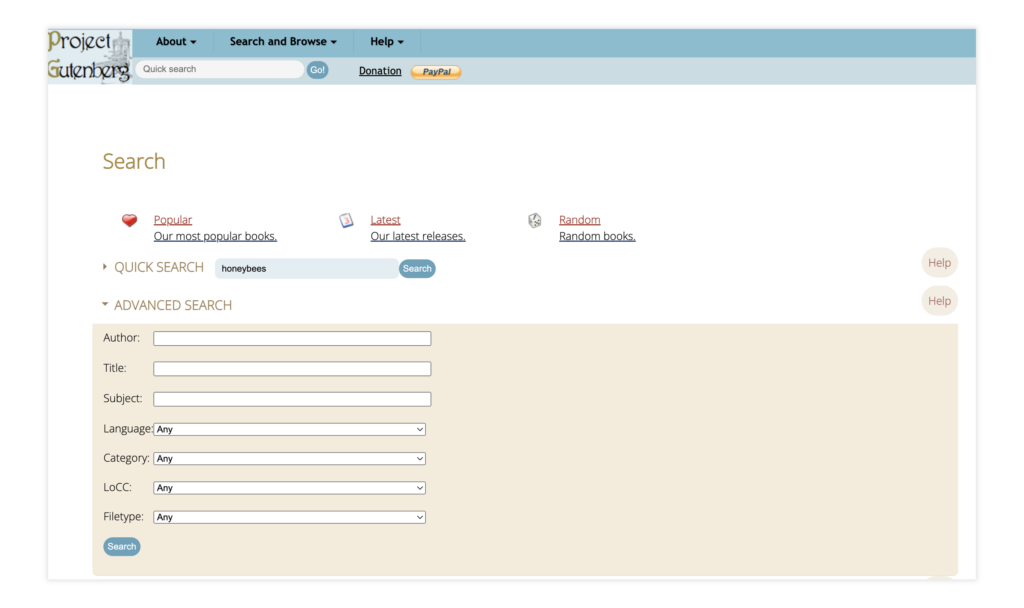
One review of Project Gutenberg often cited is how easy it is to search, and the advanced options to find books.
You can also browse the “frequently downloaded” page to get a feel for what most people want to access for free—and even find your next read.
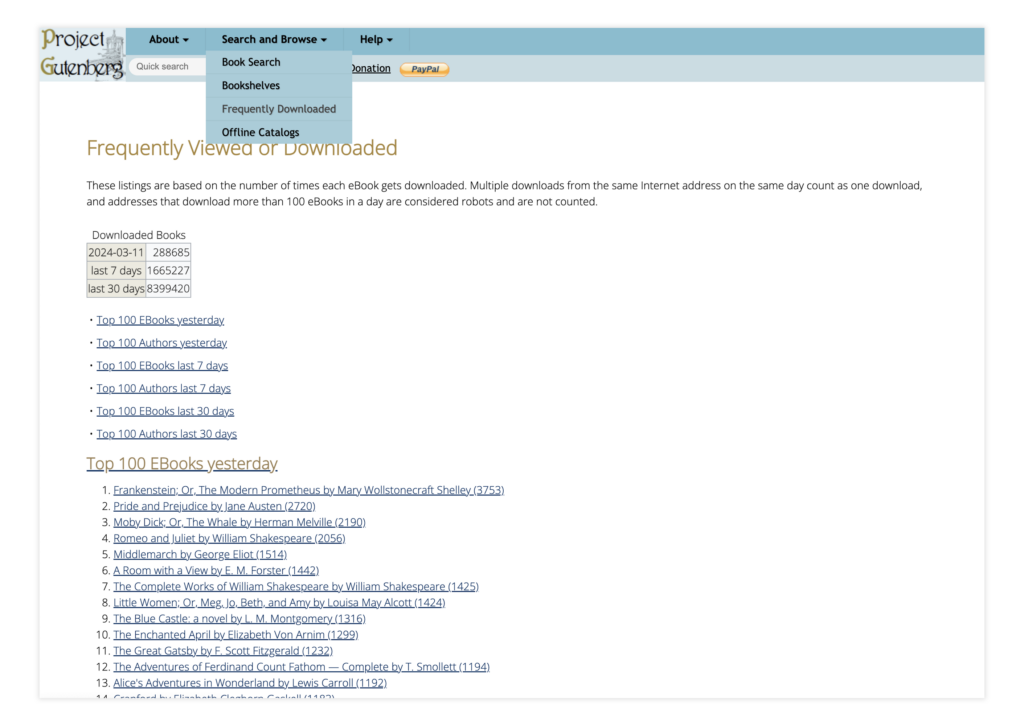
As you can see. The books primarily downloaded are those often read in literature circles, writing courses, or even college classes. This is one of the better parts of what you’ll see in a review of Project Gutenberg. It’s praised for accessibility of classic literature.
How much does Project Gutenberg cost?
As mentioned earlier, Project Gutenberg is completely free to use. The main review of Project Gutenberg is mostly positive because of this.
There are no subscription fees or charges for downloading eBooks from the platform. This makes it an invaluable resource for individuals and institutions looking to access literary works without any financial constraints.
But, you can pay something. Project Gutenberg relies on donations to cover its operating costs. Users are encouraged to contribute to the project to help ensure its continued success. However, donations are voluntary, and access to the eBooks is not contingent on making a donation.
Can anyone use Project Gutenberg?
Yes, anyone can use Project Gutenberg. The platform is open to users worldwide, and there are no restrictions based on age, location, or any other factor. Whether you’re a student, a scholar, or simply a lover of literature, Project Gutenberg welcomes you to explore its collection and make use of its resources.
In conclusion, Project Gutenberg is a remarkable resource that has revolutionized access to literature. Its vast collection, commitment to open access, and user-friendly interface make it a valuable asset for readers and researchers around the globe. Whether you’re looking to explore classic works of literature or delve into historical texts, Project Gutenberg has something to offer you.
How to Submit Your Own Work on Project Gutenberg
Part of this review of Project Gutenberg also involves submitting your own work.
Why in the world would a writer want to do that, you ask? Because it’s a part of book marketing. Obviously, you want to make money from your book, but you can also get word-of-mouth marketing by allowing your book to exist for free, knowing that some readers will get it there, but others may hear about your book and search for it on Amazon, if you published there.
The review of Project Gutenberg in this case is positive. They list very clear instructions for how to submit your work to Project Gutenberg on that page. These won’t exist on Project Gutenberg itself though.
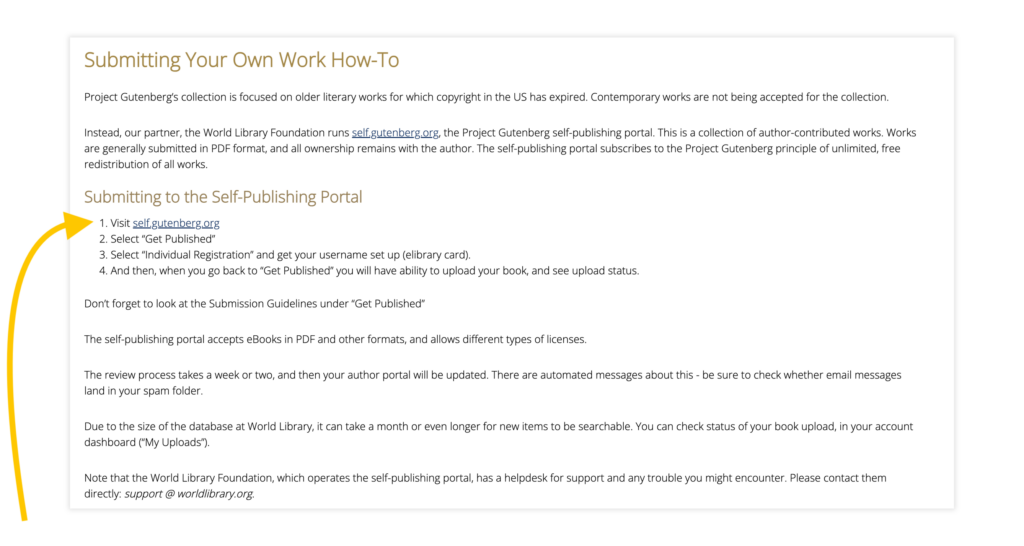
For that, they’ve created a different place to submit your work, which is Project Gutenberg Self-Publishing Press.
Review of Project Gutenberg Self-Publishing Press
If you’re wondering if this self-publishing press is worth anything, we’ve got the scoop.
Project Gutenberg Self-Publishing Press is an innovative platform that offers authors the opportunity to publish and distribute their works independently. Founded as an extension of the original Project Gutenberg, this press aims to democratize the publishing process, giving authors the freedom to publish their books without the constraints of traditional publishing houses, as with most other self-publishing platforms.
But here’s where the review for Project Gutenberg Self-Publishing Press is different. One of its key features is its commitment to open access and free distribution. Authors can publish their books on the platform at no cost, and readers can access these books for free as well. This open-access model aligns with the ethos of Project Gutenberg, which seeks to make literature accessible to everyone.
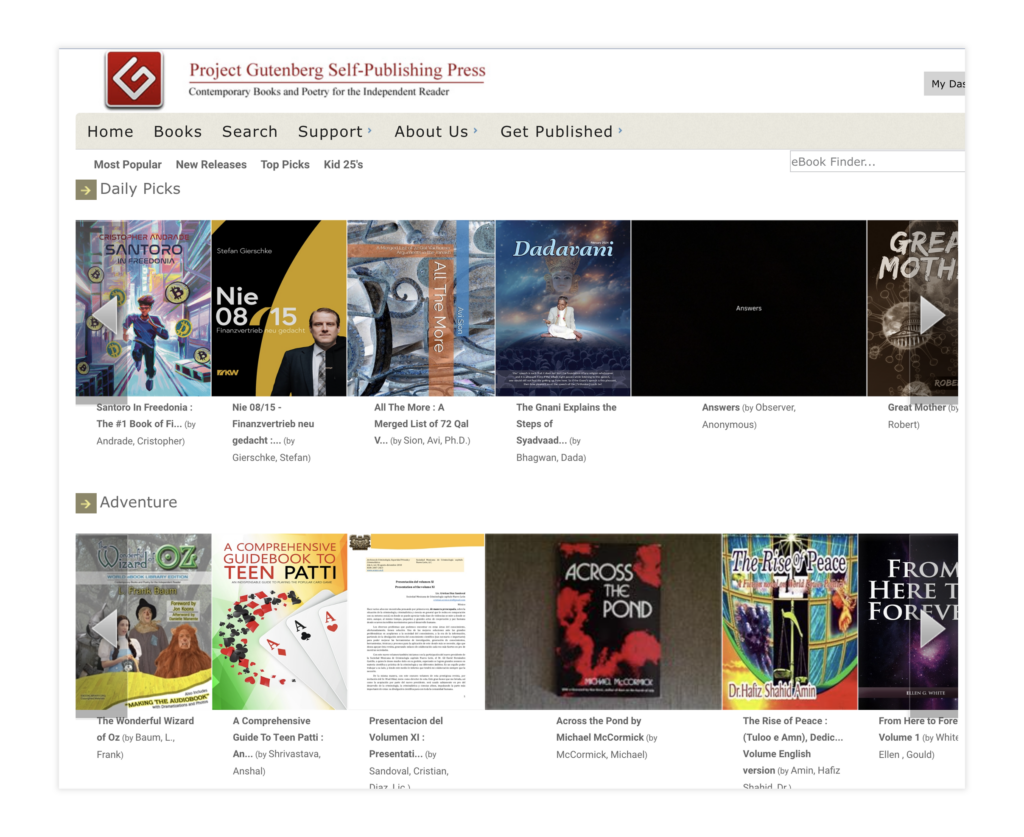
One thing to keep in mind is that this won’t make you money. The primary review of Project Gutenberg Self-Publishing Press is that it’s a strong way to make your work accessible for free, to give back, but not to make a living from your books.
If you’d like to learn how to earn an income writing, here’s a free class for that:
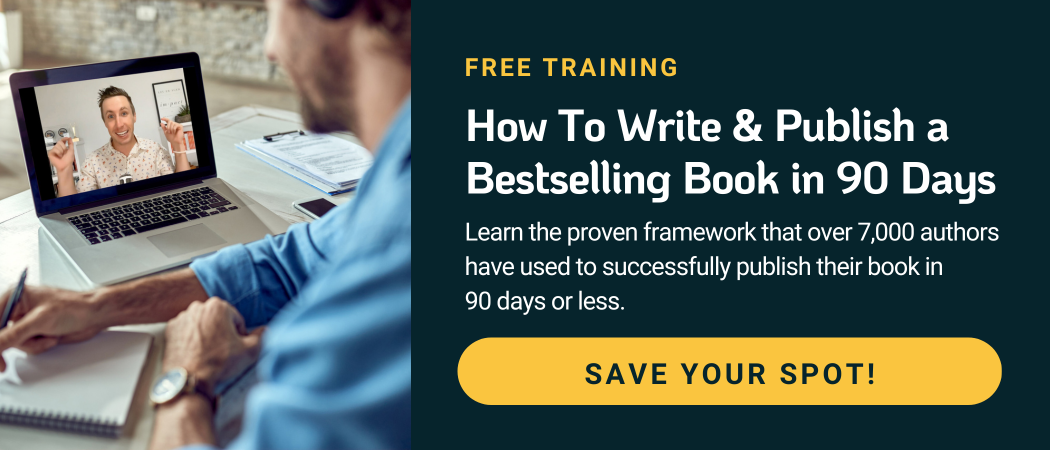
How does copyright work on Project Gutenberg?
The details of a book’s copyright law is complicated and simple at the same time. There are a lot of rules that dictate copyright, and they change depending on the country of publication.
On Project Gutenberg, the majority of eBooks are works that are in the public domain. This means that their copyright has expired, and they can be freely distributed and used by anyone. Project Gutenberg focuses on digitizing and distributing public domain works to ensure that they remain accessible to readers worldwide.
For works that are not in the public domain, Project Gutenberg obtains the necessary permissions from the copyright holders to distribute the eBooks. These works are typically made available for free on Project Gutenberg with the permission of the copyright holder.
It’s important to note that copyright laws vary by country, and what is considered public domain in one country may not be in another. Project Gutenberg makes every effort to comply with copyright laws and ensure that the works it distributes are done so legally and ethically.
Project Gutenberg Alternatives
Though this is a review of Project Gutenberg, you may still want to peruse alternatives to see what’ll work best for what you’re seeking.
Here are some alternatives for digital books:
- Internet Archive: The Internet Archive is a vast digital library that offers access to millions of free books, movies, software, music, websites, and more. It includes the Wayback Machine, which archives web pages, and the Open Library, which offers an eBook lending library.
- LibriVox: LibriVox is a volunteer-driven project that offers free audiobooks of public domain works. It features a wide range of classic literature and allows users to listen to books read by volunteers from around the world.
- Project Muse: Project Muse is a digital platform that provides access to scholarly journals and books in the humanities and social sciences. While not all content is free, it offers a selection of open-access books and journals.
- Google Books: Google Books is a service from Google that allows users to search, preview, and read a vast collection of books. While not all books are available for full view, many public domain and out-of-copyright works can be accessed freely.
- HathiTrust Digital Library: HathiTrust is a partnership of academic and research institutions that offers access to a large collection of digitized books, journals, and other materials. It includes both public domain works and copyrighted materials that are available for reading by users with print disabilities.
- ManyBooks: ManyBooks offers a collection of free eBooks that can be downloaded in various formats, including ePub, Kindle, and plain text. The site features a wide range of genres and allows users to browse by author, title, genre, and language.
- Open Library: Open Library is an initiative of the Internet Archive that offers access to a wide range of free eBooks. It features a lending library that allows users to borrow eBooks for a limited time, as well as a vast collection of public domain works.
This review of Project Gutenberg is meant to help you realize how much access there is to free ebooks online. In part so you can learn for free, but also for your to donate or give access to your book with the ultimate goal of helping more people become readers.